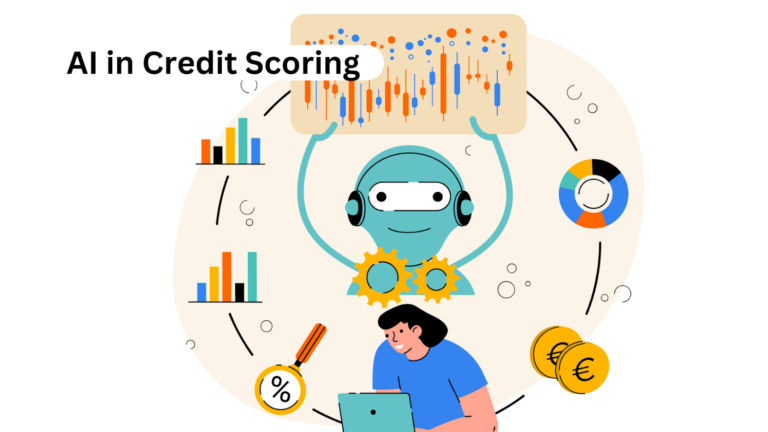Credit scoring is an important aspect of financial sectors, through which various decisions can be influenced, such as loan approvals and other processes. However, traditional credit scoring models often face challenges such as limited data availability, biased assessments, and an inability to adapt to the evolving financial landscape.
These limitations can often provide inaccurate credit evaluations, and this leading to higher default rates. For companies, these issues translate into financial losses, missed opportunities, and potential reputational damage
Artificial intelligence provides transformative solutions to overcome these challenges with its advanced algorithms. AI-driven credit scoring models can analyze a broader range of financial data to identify patterns that are difficult to identify using traditional methods. Let’s understand in depth the role of AI in Credit Scoring.
Understanding AI Credit Score and Its Impact
AI is changing the credit score business by making it possible to make more accurate, quick, and fair evaluations of creditworthiness. Traditional models only examine credit records and a few other financial signs.
AI-based scoring, on the other hand, looks at many more things, like non-financial data, trends of behavior, and even what people do on social media. Therefore, leveraging AI in credit scoring the process becomes more accurate and effective to lowers the risk of default and makes sure that people with bad credit are offered a fair evaluation.
Use Cases of AI-based Credit Scoring
Calculating Loan Interest Rates
AI personalizes loan interest rates by analyzing diverse data, including credit history and spending habits. This deeper analysis allows lenders to offer rates that are more closely aligned with individual risk profiles, improving borrower satisfaction. By offering more tailored interest rates, lenders can also increase the likelihood of loan repayment and reduce overall risk.
Credit Card Approvals and Credit Limits Determination
AI enhances credit card approvals and credit limit decisions by evaluating broader financial behavior and predictive indicators. This comprehensive approach enables more precise assessments, leading to credit offers that are better suited to the individual’s financial capacity. As a result, it minimizes the chances of overextending credit, thereby reducing the risk of defaults.
Risk Management
AI enhances risk management by providing real-time, adaptive credit assessments that quickly respond to changes in economic conditions. With this real-time capability, it allows lenders to proactively adjust their strategies, ensuring that their portfolios remain balanced. Therefore, by continuously monitoring, AI will make sure to safeguard against sudden market shifts and unforeseen economic downturns.
Customer Segmentation
AI enables more detailed customer segmentation by analyzing diverse data, including behavioral and transactional patterns. This granular segmentation allows lenders to design and offer tailored loan products that cater to specific needs, increasing customer engagement. By delivering more relevant offers, lenders can also boost conversion rates and build stronger, more loyal customer relationships.
Regulatory Compliance and Fair Lending
AI fairly makes it possible by minimizing biases and improving transparency in decision-making. It also provides transparency in building trust and meeting regulatory standards, which helps in making better decisions. However, AI ensures quick adaptation to regulatory changes, ensuring that institutions remain compliant, avoiding potential legal issues and fines.
Traditional Vs Artificial Intelligence-Based Credit Scoring
| Traditional Credit Scoring | AI-based Credit Scoring | |
| Data Sources | limited to credit history, payment behavior, debt, financial data including creditworthiness. | Aggregates a great amount of information, including non-traditional financial markers. |
| Model Type | Static statistical models that need to be updated often. | There are models of dynamic machine learning that learn and get better over time. |
| Adaptability | Models can’t be changed easily; they need to be updated by hand to represent changes in how customers act or the economy. | A lot of flexibility, since AI systems can change their predictions on the fly based on new information. |
| Inclusion | People often end up with little or no credit background, which could lead to bias. | By looking at other data sources, makes more people eligible for financial aid and lets more people be evaluated properly. |
| Processing Speed | Creditworthiness is usually checked over the course of days or weeks, which is a slower process. | Real-time processing lets you get an instant credit score, which speeds up the decision-making process. |
| Accuracy | If you only have a small amount of data, you might miss small trends or connections. | Better precision by using large and varied datasets, complex pattern and correlation analysis, and pattern and correlation identification |
| Risk Assessment | Based on a small set of standards, gives a wide estimate of credit risk. | Takes into account more factors and gives a more accurate and sophisticated measure of credit risk. |
| Customer Segmentation | Not much you can do to divide customers besides simple cash information. | Advanced client sorting makes it possible to make personalized loan offers and marketing plans. |
Summary
AI-based credit scoring provides a significant benefits as compared to traditional methods. However, AI-driven credit scoring, delivers diverse data sources, including non-financial markers, to deliver more accurate and fair evaluations. Therefore, to leverage the benefits of AI in credit scoring, hire top AI engineers to design and build a system that can drive your business with advanced credit scoring models.

